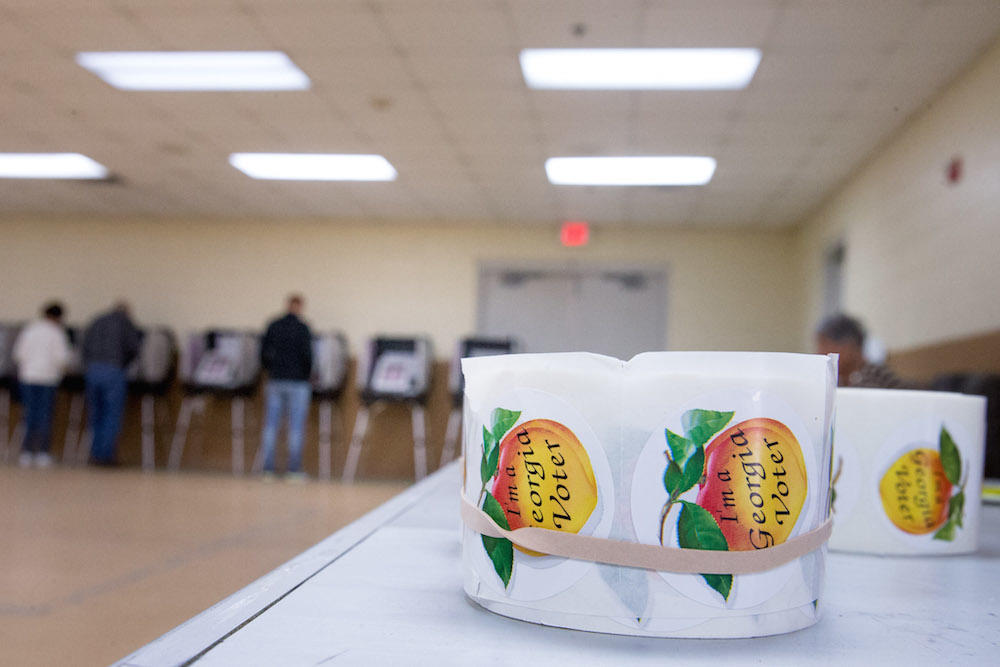Section Branding
Header Content
About 4,500 Georgians Reactivated Voter Registrations Ahead Of Purge Deadline
Primary Content
Just under 4,500 Georgia voters acted to keep their voter registrations from being purged this week, a small percentage of more than 313,000 registrations set to be canceled for inactivity and failure to respond to election officials.
308,753 registrations were moved from “inactive” to “canceled” status Monday night as part of federally-required voter list maintenance, according to an updated list from the Georgia secretary of state’s office.
In late October, the state publicly released a list of 313,243 inactive voter registrations that belonged to people who either filed a national change of address form, had election mail returned as undeliverable or did not vote or make contact with elections officials for at least seven years.
MORE: Judge Oks Purge Of 300,000 Inactive Georgia Voter Registrations
107,645 of those registrations were deemed inactive because of the NCOA form, 83,517 were because of undeliverable mail and 117,771, or 38%, were because of the controversial no contact or “use it or lose it” law.
Those voters were deemed inactive after three years of not voting or having contact with elections officials, then were eligible for removal after no voting or contact for two more federal elections cycles, or seven years total.
The demographic and geographic breakdown of the list mirrors Georgia’s larger population, according to an analysis of canceled voters done by GPB News.
A third of those voters came from the four largest counties around Atlanta, which is home to a third of Georgia’s population, and about three in 10 registrations that were canceled belonged to black voters, who make up a similar share of the state’s active voters.
Following the release of the list of potentially-purged voters, the state mailed out notifications and groups like Fair Fight Action and the Democratic Party of Georgia began contacting people warning them of the impending change.
RELATED: Georgia Releases List Of 313,000 Voter Registrations To Be Removed In December
Democratic presidential candidates even got in on the effort, calling and texting people the day after the primary debate at Tyler Perry Studios in Atlanta.
Some of those reached had moved out of state or died, but others updated their registrations, connected with their local elections officials or voted in the November municipal elections to move back into active status.
A federal judge on Monday allowed the state to proceed with the scheduled list maintenance activities but has scheduled a hearing for Thursday to decide whether some of those cancelled no-contact registrations should be moved back to inactive status.
Lawyers for Fair Fight, founded by former Democratic gubernatorial nominee Stacey Abrams, sought to block those registrations from being removed because of a recent change to state law.
After HB 316 was signed earlier this year, the period voters had before being declared inactive was increased to five years instead of three, so the lawyers argued that many of those no-contact voters should still have two years to go before facing removal.
In a pair of tweets, Fair Fight said it would continue to fight for voters it believes are "illegally purged" from Georgia's voter rolls.
"These 4,500 voters' desire to remain on the voting rolls shows why no Georgian should lose their right to vote simply for not expressing that right in recent elections," the organization said. "We look forward to tomorrow's hearing and continuing to fight for voters illegally purged this week under the unconstitutional 'use it or lose it' practice violating the very law championed by the Secretary of State. Thank you to the volunteers and allies who have stood with us."
Any Georgia voter that had their registration cancelled can re-register to vote ahead of any elections in 2020.
Judge Steve Jones said Georgia could continue with its process after lawyers for the state said those “use it or lose it” registrations could be reinstated to the inactive list within 24 hours if the judge ordered them to.
Georgia now has more than 7.1 million registered voters heading into a year where the secretary of state’s office is planning for record turnout in the November general election.


